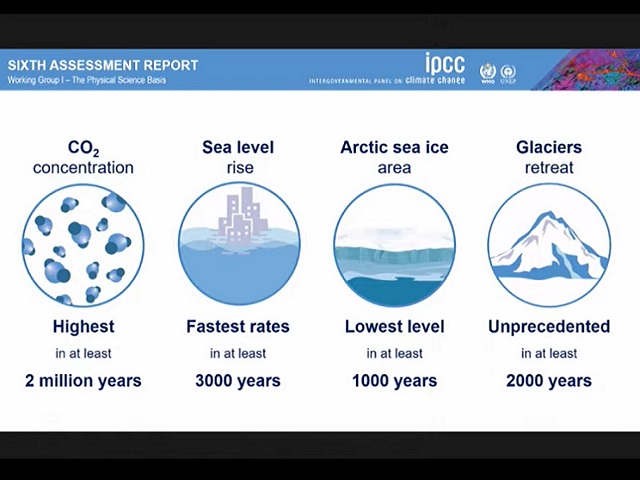Context
-
The Intergovernmental Panel on Climate Change releases its next report titled “Climate Change 2021: the Physical Science Basis”.
About IPCC Climate Change 2021
- It is prepared by the scientists of Working Group-I. The two remaining parts would be released in 2022.
- It noted that global net-zero by 2050 was the minimum required to keep the temperature rise to 1.5 degree Celsius.
- It sets the stage for the Conference of Parties (CoP) 26 conference in November 2021.

- With a warning that a 1.5 degree warming was likely even before 2040, the Inter-governmental Panel on Climate Change (IPCC) has tried to make a case, much stronger than before, for immediate cuts on global greenhouse gas emissions.
- For India, it is likely to translate into increased pressure to agree to a net-zero target, a deadline by which it should be able to bring down its emissions to a level that equals the absorptions made by its carbon sinks, like forests.
- In the case of the Sixth Assessment Report, the fact that the 1.5 degree Celsius warming has been shown to be closer than thought is likely to trigger widespread calls for stronger, more wide-ranging emission cuts from all countries.
- Not that the 1.5 degree deadline has not been discussed earlier. But this is the first time that the IPCC has said that the 1.5 degree warming was inevitable even in the best case scenario.
- The most ambitious emission pathways would lead to the warming be achieved in the 2030s, overshoot to 1.6 degree C, before the temperatures drop back again to 1.4 degree C by the end of the century.
- Several countries, more than 100, have already announced their intentions to achieve net-zero emissions by the middle of the century. These include major emitters like the United States, China and the European Union.
- India, the third largest emitter in the world, has been holding out, arguing that it was already doing much more than it was required to do, performing better, in relative terms, than other countries, and that any further burden would jeopardise its continuing efforts to pull its millions out of poverty.
- The IPCC said that a global net-zero by 2050 was the minimum required to keep the temperature rise to 1.5 degree Celsius. Without India, this would not be possible. Even China, the world’s biggest emitter, has a net-zero goal for 2060.
Need of the Hour
- For the purposes of global warming and its impacts, the pathways are as important as the destination. Immediate emission cuts and a steady pathway to net-zero is expected to bring better benefits than a business-as-usual scenario and a sudden drop in emissions towards the end to meet the target.
- Even for the countries that have pledged a net-zero target, the substantial part of their emission cuts is planned only for 2035 and beyond.
- The new evidence in the IPCC report is likely to put pressure on them as well to reconsider their pathways.
- The science is clear, the impacts of the climate crisis can be seen around the world and if we don’t act now, we will continue to see the worst effects impact lives, livelihoods and natural habitats.
- The next decade is decisive, follow the science and embrace your responsibility to keep the goal of 1.5C alive.
- We can do this together, by coming forward with ambitious 2030 emission reduction targets, and long-term strategies with a pathway to net zero by the middle of the century, and taking action now to end coal power, accelerate the roll out of electric vehicles, tackle deforestation and reduce methane emissions.
Nationally-Determined Contributions or NDCs
- The IPCC report could also lead to renewed demands that all countries update their climate action plans, called nationally-determined contributions or NDCs in official language.
- Under the Paris Agreement, every country has submitted an NDC, listing the climate actions they intend to take by 2025 or 2030.
- These NDCs have to be updated with stronger action, mandatorily, every five years from 2025. But the Paris Agreement also “requested” countries’ NDCs by 2020. Because of the pandemic, the deadline was extended to 2021, and expired at the end of July.
- About 110 countries have updated their NDCs, but not China or India, or South Africa.
- After the release of the IPCC report, several scientists and officials, including executive secretary of UN Climate Change Patricia Espinosa, lamented the fact that only half the countries had updated their NDCs with stronger action.
Conclusion
- All nations that have not yet done so, still have the opportunity to submit ambitious NDCs. Nations that have already submitted new or updated NDCs still have the opportunity to review and enhance their level of ambition.
Environment Current Affairs 2021 : Click Here
